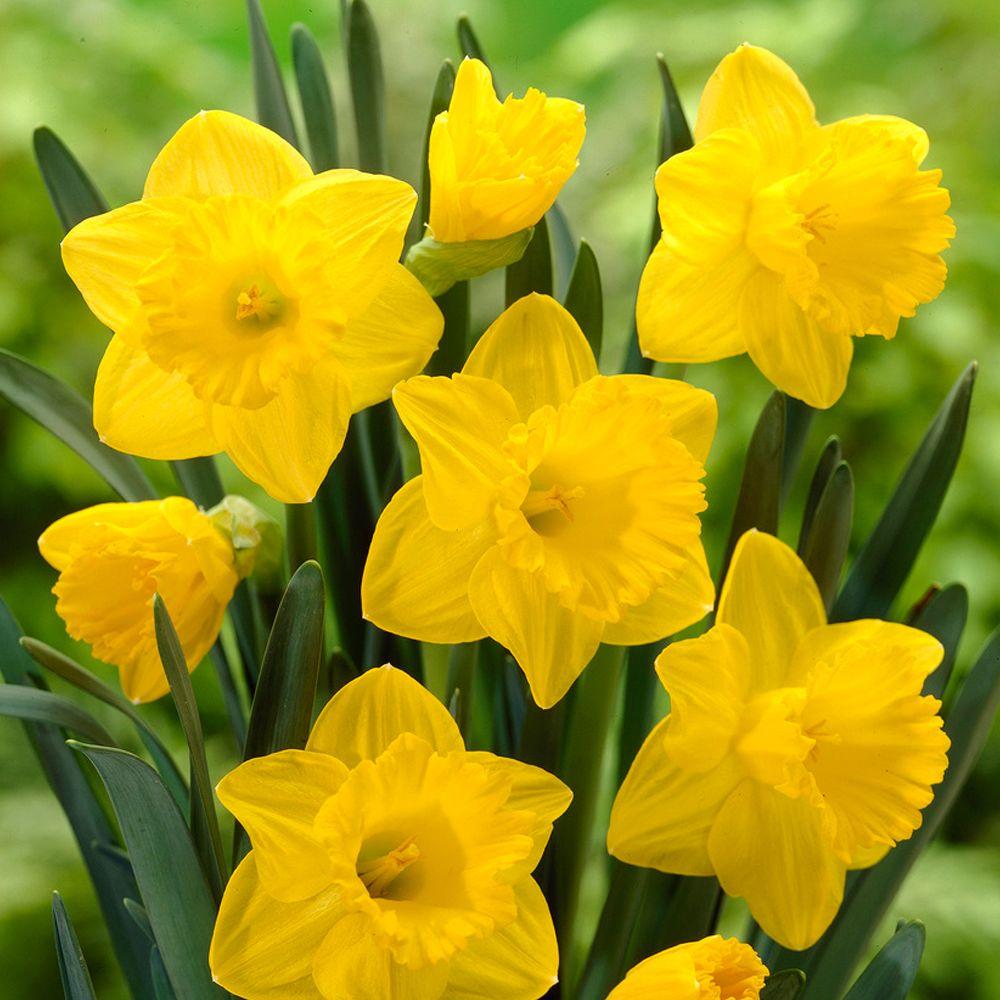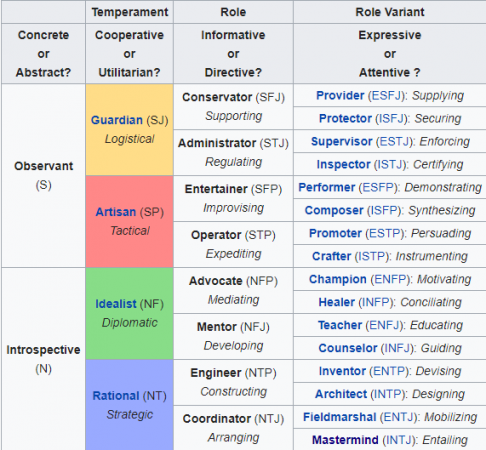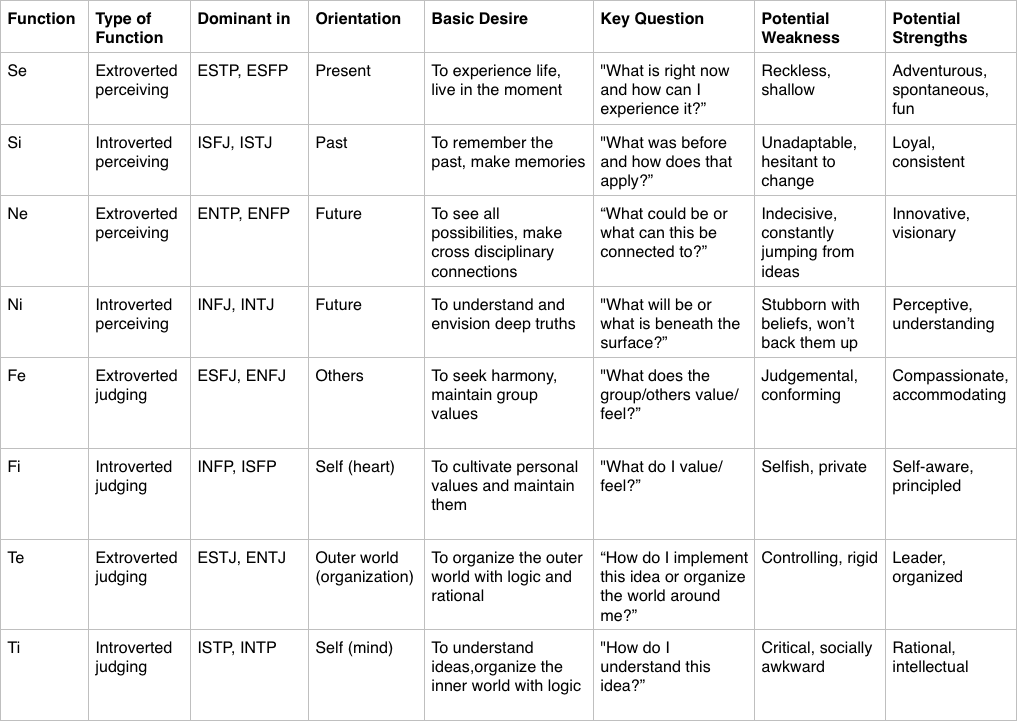
Wiki / Myers-BriggsTypologie
Inhaltsverzeichnis: (verbergen)

Osterglocken |
|
Am besten erkennt man den Charakter eines Menschen bei Geldangelegenheiten, beim |
| ||||||||||||||||||||||||||||||||
| ||||||||||||||||||||||||||||||||||||||||||||||||||||||||
|
| Referenz: de.Wikipedia-Eintrag ► Temperamentenlehre |
| Siehe auch: ► Gewissen |
| See also: ► Characteristics of the four temperaments and ► Four temperaments and their correspondences ► Fourfold nature of the psyche and various fourfold constellations |
| |||||||||||||||||||||||||||||||||||||||||||||||||||||||||||||||
Das Erwachsen-Werden und das Reifen gehen einher mit der Überwindung von Angst und Scham.
| Der deutsch-britische Professor für Psychologie Prof. Hans Eysenck (1916-1997) entwickelte ein faktorentheoretisches Persönlichkeitssystem, wonach die Persönlichkeit jedes Individuums das Resultat der Ausprägung der Dimensionen Introversion-Extraversion und Labilität-Stabilität ist. |
| Der hysterische Choleriker ist extravertiert und labil (EL). | Fühlender labiler Extravertierter (Empfindungstyp) |
| Der zwanghafte Melancholiker ist introvertiert und labil (IL). | Fühlender labiler Introvertierter (Intuitiver Typ) |
| Der schizoide Sanguiniker ist extravertiert und stabil (ES). | Denkender stabiler Extravertierter |
| Der depressive Phlegmatiker ist introvertiert und stabil (IS). | Fühlender stabiler Introvertierter |
| ||||||
|
| Referenzen: ► Eintrag Element, präsentiert von der Datensammlung Astrowiki, undatiert ► Artikel von Werner Stangl, Fritz Riemanns "Grundformen der Angst", präsentiert von der Publikation Werner Stangls Arbeitsblätter, undatiert |
| Reference: ► Article by Gregory Mitchell, Carl Jung & Jungian Analytical Psychology, presented by the publication Mind Development Home Page, 2005-2019 |
| ||||||||||||||||||||||||||||||||||||||||||||||
| Referenz: de.Wikipedia-Eintrag ► Vier-Elemente-Lehre |
| Referenz-Literatur: ► Carl Gustav Jung (1875-1961) Schweizer Psychiater, Psychoanalytiker, Gründer einer neuen Denkschule der analytischen Tiefenpsycho- logie, Autor, Karl Kerényi (1897-1973) ungarischer klassischer Philologe, Religionswissenschaftler, Autor, Einführung in das Wesen der Mythologie, Rascher, Zürich, 1941, Pantheon, Amsterdam, 1941, Patmos Verlag, 1999 ► Ulrich Stoll, Gundolf Keil, Autor, Herausgeber, Paul Schnitzer, Herausgeber, Josef Domes, Herausgeber, Das Lorscher Arzneibuch und die frühmittelalterliche Medizin. Verhandlungen des Medizinhistorischen Symposiums im September 1989 in Lorsch, Laurissa, Lorsch, 1991, Steiner, Stuttgart, 1992 – Referenz: Umfangreiche medizinische Handschrift aus der Zeit Karls des Großen zur Klostermedizin aus dem abendländischen Frühmittelalter 'Lorscher Arzneibuch, ~785 ► Gernot Böhme, Hartmut Böhme, Feuer, Wasser, Luft, Erde. Eine Kulturgeschichte der Elemente, C.H. Beck, München, 1996, 1. Auflage 19. Februar 2004 ► Carl Gustav Jung (1875-1961) Schweizer Psychiater, Psychoanalytiker, Gründer einer neuen Denkschule der analytischen Tiefenpsycho- logie, Autor, Lorenz Jung, Herausgeber, Archetypen, 1997, Deutscher Taschenbuch Verlag (dtv), 1. Auflage 1. Januar 2001 ► Bernhard D. Haage, Wolfgang Wegner, Medizin in der griechischen und römischen Antike, Springer Lehrbuch, Berlin Heidelberg, 2013, zitiert in: Werner E. Gerabek, Bernhard D. Haage, Gundolf Keil, Wolfgang Wegner, Herausgeber, Enzyklopädie Medizingeschichte, S. 915-920; hier S. 916, De Gruyter, Berlin, New York, 1. Auflage 15. November 2004 |
| Siehe auch: ► Vier Elemente und ► Vier Seinsebenen – Hartmann • Gebser • Heim |
| See also: ► Four temperaments correlated with elements, qualities, beings and solids |
|
| Referenz: de.Wikipedia-Eintrag ► Keirsey Temperament Sorter |
| Siehe auch: ► Quaternität – Vierheit und das I Ging ► Vier Persönlichkeitstypen in der Liebesbeziehung ► Metamorphosen über vier Stationen – 3:1 |
|
Persönliche Bekenntnisse
| ||||||||||||||||||||||||||||||||||||||||||||||||||||||||||||||||||||||||||||||||||||||||||||||||||||||||||
| References: ► Wikipedia entry Keirsey Temperament Sorter – Guardian ◊ Rational ◊ Idealist ◊ Artisan ► [*]Entry Overview of the Four Temperaments – David Keirsey, presented by the publication Keirsey.com, undated ► Entry The Four Temperaments correlated to Myer-Briggs types – David Keirsey, presented by the website personalitypage.com, undated |
| See also: ► Enneagramm ► Four temperaments and their correspondences ► Three mating drives Helen Fisher ∞ Three types of integration of Yin and Yang Lao Tzu ► Hitler's extremist path ⇔ Mandela's moderate path |
Age-old dichotomy between realists ⇔ idealists / enneagram #8 ⇔ enneagram #1 / cholerics ⇔ melancholics
|
US American Katharine Cook Briggs and her daughter Isabel Myers read many new psychology books published in Europe. Both studied Carl Gustav Jung’s work including the concepts of introversion and extroversion. Jung’s work represents the basis for the Myers-Briggs Type Indicator (MBTI). It is a framework for classifying personality types along
The four fundamental personality types in the Myers-Briggs typology correlate almost exactly with the four astrological-elemental types:
An individual has one dominant preference in each of the four pairs.
Example: An introverted sensor, thinker and perceiver is an ISTP in Myers-Briggs shorthand.
 |

|
| ||||||||||||||||||||||||||||||||||||||||||||||||||||||||||||||||||||||||||||||||||||||||||||||||||||||||||||||||||||||||||||||
| Source: ► 16 Personalities – Personality Types, presented by NERIS Analytics Limited, 2011-2016 |
| Reference: ► The Best Jobs For Every Personality Type, presented by the US American business news website Business Insider Richard Feloni and Skye Gould, 4. September 2014 |
| See also: ► Myers Briggs personality types |
| |||||||||||||||||||||||||||||||||||||||||||||||||||||||||||||||||||||||||||||||||||||||||||||||||||||||||||||
| |||||||
Complimentary questionnaire to find out one's Myer-Briggs personality type Human Metrics
| Sources and references: ► Overview The Sixteen Personality Types, presented by truity.com, undated ► Article The Definition Of Hell For Each Myers-Briggs Personality Type, presented by Heidi Priebe,12. May 2015 |
| Forum: ► Forums for MB types like INTP Forum - The Thinkers (Registration required) |
| Reference: en.Wikipedia entry ► Myers–Briggs Type Indicator |
| Referenz: de.Wikipedia entry ► Myers-Briggs-Typenindikator |
| See also: ► Enneagram ► Characteristics of and myths about introverts ► Features of empaths – Judith Orloff |
| |||||||||||||||||||||||||||||||||||||||||||||||||||||||||||||||||||||||||||
| Sources: ► Overview Profiles of the 16 Myers Briggs Personality Types, presented by truity.com, undated ► Overview 16 personality type profiles, presented by the website Personality Junkie, Dr. A. J. Drenth, undated |
| Reference: en.Wikipedia entry ► Four temperaments |
| Siehe auch: ► Archetypen |
According to Marie-Louise von Franz11, the primitive function will often sabotage one's conscious aims in life.
Having one's full consciousness developed means one is fully aware of one's inferior side.
| ||||||||||||||||||||||||||||||||||||||||||||||||||||||||||||||||||||||||||||||||
|
Individuation calls for one to become fully aware of the inferior function, "the devil speaking" but also where the angels can come in. One cannot simply tackle the inferior function directly, on a conscious level. Here is where Jung's transcendent function comes in, creating or drawing upon uniting or reconciling symbols which allows one to find not perfection, but wholeness or completeness, and helps one to find useful ways of expressing the opposites in one's life. Jung's concept of religious experience includes this reconci- |
| |||||||||||||||||||||||||||||||||
| |||||||||||||||||||||||||||
| Reference: ► Article by Michael T. Robinson, Cognitive Functions Explained In Simple Terms, presented by CareerPlanner.com (1997-2018), undated |
| See also: ► Enneagram |
| The Socionics model A of the psyche, using Carl Jung's typology as a foundation, was created in the 1970's by the Lithuanian psychologist, sociologist, and economist Aushra Augusta (†2005). He was the dean of the Vilnius Pedago- gical University's department of family science. Socionics has 16 sociotypes. A person gravitates only to one sociotype, a specific, unique mode of information meta- bolism. It pairs 8 information elements with 8 functions. |
| |||||||||||||||||||||||||||||||||||||||||||||||||||||||||||||||||||||||||||||||||||||||||||||||||||||||||||||
| ||||||||||||||||||||||
|
| ||||||||||||
To find one's own Socionics type a questionaire is offered: Sociotype Test
| See also: ► Enneagram |
 |
|
|
INFPs, called "the mediator", "the true harmonizer" and "the authenticator", are paradoxical beings.
|
|
INFP AQUARIUS
|
|
Ten phrases not received graciously by INFP types
|
|
ENFPs juxtaposed to INFPs
|
 |
|
| Written references: ► Article INFP Personality Type – The Idealist, presented personality perfect, undated ► Article 12 Secrets of the INFP Personality Type, presented by the online publication Introvert, Dear, Jenn Granneman, 14. January 2018 ► Article INFP Personality Type Profile, presented by the publication Psychology Junkie, Dr. A.J. Drenth, undated |
| See also: ► Enneagram |
| |||||||||||||||||||||||||||||||
| Source: ► Speech by Rev. Martin Luther King, Jr. (1929-1968) US American Baptist minister, activist, leader of the African American civil rights movement, Nobel Peace Prize laureate, 1964, Remaining Awake Through a Great Revolution, National Cathedral, Washington, DC, 31. March 1968, Congressional record, 9. April 1968 |
| ||||||||||||||||||||||||||||||||||||||||||||||||||||||||

|
| Reference: en.Wikipedia entry ► Four temperaments |
| Reference: ► Q&A contribution What are the four temperaments?, presented on the Californian question-and-answer website Quora, Elfriede Ammann, 977 views · 5 upvotes, 10. January 2019 |
| See also: ► Conscience and ► Enneagram ► Four temperaments and their correspondences ► Fourfold nature of the psyche and various fourfold constellations ► Teaching systems Trivium and Quadrivium – The seven liberal arts ► Various four quadrant typologies – Outlining the Human Design System ► Reactions to encountering the seventh vault of the seventh heaven |
| Siehe auch: ► Eigenschaften der vier Temperamente |
| ||||||||||||||||||||||||||||||||||||||||||||||
| References: en.Wikipedia entries Classical element and ► Astrology and the classical elements |
| See also: ► Four elements |
| Siehe auch: ► Vier Temperamente korreliert mit Elementen, Eigenschaften, Wesen und Körpern |
Links zum Thema Myers-Briggs Typologie / Myers-Briggs typologyLiteratur
Literature (engl.)
Externe WeblinksGoogle-Suche zum Stichwort Enneagramm: 141.000 Ergebnisse
Human Design
External web links (engl.) Wikipedia entries Keirsey Temperament Sorter, Myers–Briggs Type Indicator, Four temperaments Audio- und VideolinksAudio and video links (engl.)
The four basic temperaments i.e. personality types were defined by Plato, Aristotle, Galen (2nd century A.D.), refined by >Jung and Myer-Briggs, and included in the nine types of the Enneagram: #1, #7, #8, #9. Greek physician, outstanding figure in the history of medicine,
Description of Perfect people: enneagram #1
|
Englisch Wiki
Hawkins
1 Kurzprofile der neun Enneagrammtypen ⇑
2 Artikel Persönlichkeit nach Eysenck, präsentier von Online Lexikon für Psychologie und Pädagogik, 5. Oktober 2019 ⇑
3 Blogartikel Das narzisstische Dilemma: Ein Lösungsansatz, präsentiert von der Geschichten-Publikation Medium, The New Worker, Frank Widmayer, 19. Dezember 2017
Anhand der Verhaltenspräferenzen der vier Basistypen ergibt sich für typisch narzisstische Eigenschaften eine auffällige Deckung mit den roten (Dominanz) und gelben (Initiative) Typen. ⇑
4 Gelöschter Artikel Eine Studie behauptet, es gäbe nur vier Persönlichkeits-Typen – Welcher wärst du?, präsentiert von der deutschen Wochenzeitschrift Stern, 20. September 2018 ⇑
5 Average Neuroticism (+) Extraversion (+) Openness (-)
Self-centered Extraversion (+) Openness (-) Agreeableness (-) Conscientiousness (-)
Role model Neuroticism (-) Extraversion (+) Openness (+) Agreeableness (+) Conscientiousness (+)
Reserved Extraversion (-) Neuroticism (-) Agreeableness (+) Conscientiousness (+)
Article There’s an infinite spectrum of personality types that science will never understand, presented by the US American online portal Quartz, Olivia Goldhill, 20. September 2018 ⇑
6 Dr. Daniel Kahneman (1934-2024) israelisch-amerikanischer Professor für Psychologie, Gründer der Verhaltensökonomie, Nobelpreisträger für Wirtschaftswissenschaften, 2002, Princeton Universität, New Jersey, Autor, Schnelles Denken, langsames Denken, Siedler Verlag, 25. Auflage 21. Mai 2012 ⇑
7 Hinton Lecture by Sir Samuel Brittan, one of the United Kingdom's foremost political economists, An Ethical Foreign Policy?, Harvard School of Public Health,
24. November 1999 ⇑
8 Kenneth Waltz, Theory of International Politics, Addison-Wesley, Reading, Massachussetts, 1979
Robert O. Keohane, International Liberalism Reconsidered, in: John Dunn, The Economic Limits to Modern Politics, S. 165-194, Cambridge University Press, Cambridge, Massachussetts, 1990 ⇑
9 INTJ Personality Type & Traits, presented by Personality Junkie, Dr. A. J. Drenth, undated ⇑
10 INFP Personality Type: The Creative Seeker, presented by Personality Junkie, Dr. A. J. Drenth, undated ⇑
11 Lectures on Jung's Typology, Seminar Series, volume 4, Spring Publication, 1. paperback edition January 1983 ⇑